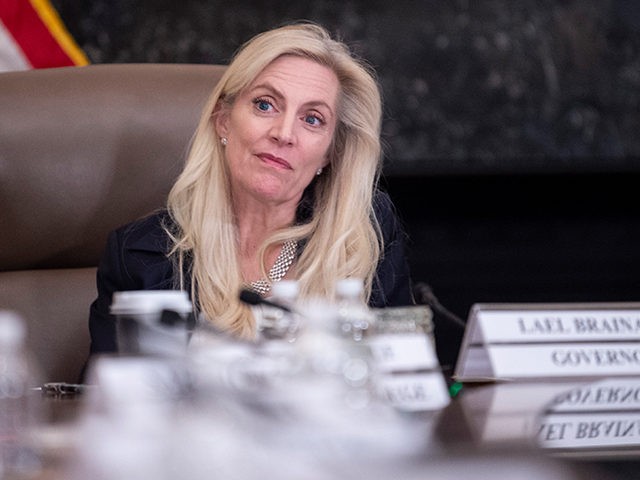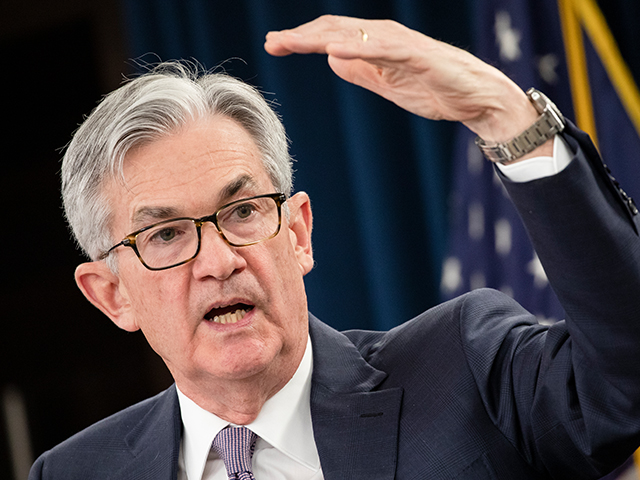It appears increasingly likely that the Federal Reserve will raise interest rates by three-quarters of a percentage point when it meets this month.
The odds implied by the fed funds futures market of a 75 basis point hike topped 80 percent at one point this morning. They’ve since slid back down to 75 percent, which is still overwhelming odds for a big hike. Rather than push back against what the market is implying, Fed officials on Wednesday appeared to encourage the market in this way of thinking.
Federal Reserve Bank of Cleveland President Loretta Mester said Wednesday that she thinks the fed funds rate will need to be above four percent sometime early next year. Other Fed officials, including St. Louis Fed President James Bullard, have said they want to get there by the end of this year. “I don’t really see why you want to drag out interest-rate increases into next year,” Bullard said. “I think you might as well do it relatively quickly.”
You can do the math on this fairly easily. The current Fed target rate range is 2.25 percent to 2.50 percent. There are three meetings this year—in September, November, and December—and then not another one until February of 2023. So if the Fed is going to get its target to around four percent before that February meeting, it will need at least one 75 basis point hike this year. Given that, it seems likely that Fed officials would lead off with the bigger hike rather than hold it in reserve for some reason.
Fed chairman Jerome Powell has shown a keen interest in how the market interprets central bank communications and actions. We think there’s a good chance that surprising markets with a smaller than expected hike would be interpreted as the Fed backing off its struggle to bring down inflation—and we think Powell understands this. After beating back the skeptics about the Fed’s dedication to the anti-inflation cause with his speech at Jackson Hole in August, we doubt he’d want to squander that hard-won victory by going weak in the knees now. That’s especially true because there’s nothing to be gained by holding back on the bigger hike until November or December.
Powell and his fellow Fed official also seem to be very reluctant to surprise the market. They have been extraordinarily open about their plans, their views of the economy, and the evolution of their thinking on inflation. So we doubt that Powell would let the market become this convinced that a 75 basis point hike was coming if he thought there was a good chance that the central bank would opt for a smaller hike.
Fed Vice Chairwoman Lael Brainard gave a speech in New York Wednesday. While she didn’t express a preference on the size of the next increase her argument for an all-out fight against inflation bears scrutiny. Brainard is a former Clinton administration economic adviser who spent the Bush administration at the Brookings Institution. She served at undersecretary for international affairs in Obama’s Treasury Department before being appointed a Fed governor by Obama. Biden considered appointing her as Treasury Secretary but instead elevated her to Vice Chair of the Fed. She’s considered someone who started out as a Larry Summers-style center-left Democrat and has moved to the left with the rest of her party.
In her speech, Brainard appeared in part to be addressing leftwing critics of the Fed’s pursuit of price stability campaign. They have argued that the central bankers are being cavalier about the risks of recession and higher unemployment. Brainard offered a rebuttal to these critics by pointing out that inflation in food and energy prices are especially hard on poorer Americans. “While price increases in food and energy are weighing on discretionary spending by all Americans, they are especially hard on low-income families, who spend three-fourths of their income on necessities such as food, gas, and shelter—more than double the 31 percent for high-income households,” Brainard said.
Brainard, in other words, is making a case against inflation that is intended to appeal to self-described progressives. We think this makes it more likely that the Fed will be able to stick to its guns next year if unemployment is climbing and leftist criticism reaches a crescendo.


COMMENTS
Please let us know if you're having issues with commenting.